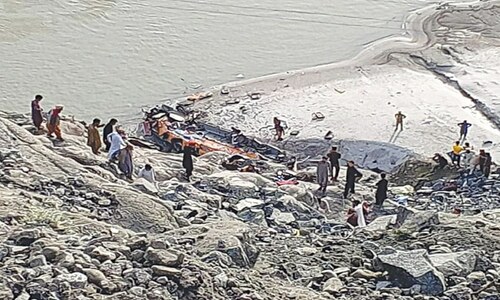WASHINGTON, Dec 31: US Secretary of State Colin Powell has not only endorsed President Pervez Musharraf's decision to retain his uniform (briefly reported in Dawn's Friday issue) but has also backed his policies even on issues that are considered sensitive in America, such as granting of amnesty to Dr A.Q.Khan and his handling of the military campaign in Waziristan.
Mr Powell's strong endorsement of the Pakistani leader came hours after the general said he would continue both as the army chief and the president. It was in the spirit as President Bush's statement, made during Gen Musharraf's recent visit to the White House, that he looked forward to "working closely" with the Pakistani president for the next four years.
Analysts in Washington say that during Gen Musharraf's visit to the White House on Dec 4, the Bush administration had made it clear that it was not interested in any political change in Pakistan at this stage and Mr Powell further strengthened this policy by reiterating America's unflinching support to the Pakistani leader.
Mr Powell, in an interview to a group of French journalists in Washington late Thursday afternoon, rejected a suggestion that Gen Musharraf breached any law in wanting to retain his position as the chief of his country's powerful army. President Musharraf, he said, had only exercised the option the Pakistani parliament had given him.
"The parliament provided for means for him to do this. He has exercised that option and it is now a matter for the Pakistan people and the Pakistan parliament, which has already judged this, to make any other judgements they wish to make," said Mr Powell.
As far as the US administration was concerned, it will continue to work with President Musharraf and the government of Pakistan, he added. Mr Powell recalled that President Musharraf had earlier pledged to take his uniform off and retire from the army but later, "with the support of the parliament, decided that this would not be in the best interest of the country".
Defining the US approach to its relations with Pakistan, Mr Powell emphasized that it's Pakistan's role in the war against terror that would determine Washington's policies towards Islamabad.
"What I have to look at is where Pakistan has been back in 2001 and where it is now", he said while explaining how the US government dealt with issues concerning Pakistan.
The issues, he said, he would look at were how "it has moved toward democracy, has dealt with the problem of A.Q.Khan and has joined the war against terrorists." Later, Mr Powell also disagreed with a suggestion that Pakistan was not doing enough to catch Taliban and Al Qaeda suspects along the Afghan border.














































Dear visitor, the comments section is undergoing an overhaul and will return soon.